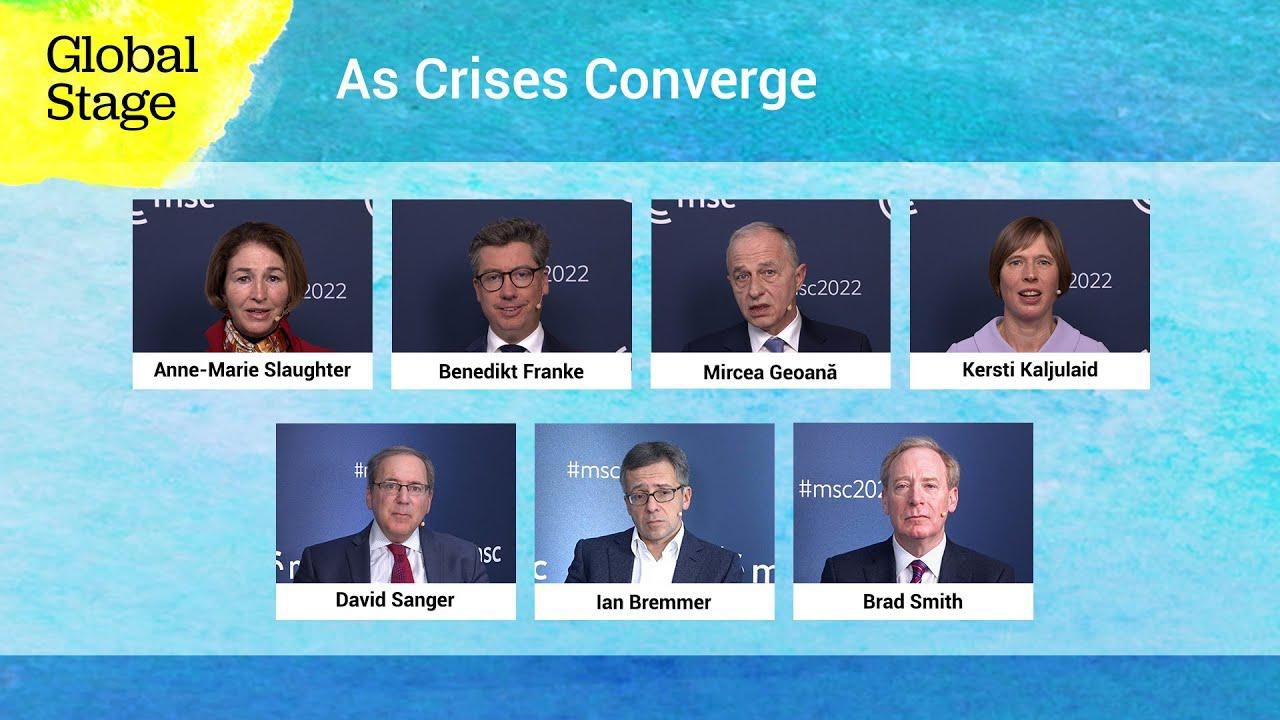
World leaders were on hand Friday for the start of the Munich Security Conference amid increasing tensions over Ukraine. In a Global Stage livestream conversation in Munich, moderator David Sanger of The New York Times discussed the Russian threat and the need to secure cyberspace with the former president of Estonia, Kersti Kaljulaid, NATO Deputy Secretary General Mircea Geoană, Benedikt Franke, chief executive officer of the Munich Security Conference, Anne-Marie Slaughter, CEO of New America, Ian Bremmer, president of Eurasia Group and GZERO Media, and Brad Smith, president and vice chair of Microsoft.
When world leaders gathered for the Munich Security Conference two years ago — against the backdrop of Brexit and President Donald Trump’s “America First” approach to foreign policy — there was a sense of a lack of cohesion, of “Westlessness” among the allies. This year couldn’t look more different.
With Russia saber-rattling over Ukraine and the threat of military escalation looming, the NATO alliance has been given a fresh lease of life with a reason to unify.
“This is a uniquely coherent and cohesive Munich Security Conference, because every NATO ally is completely convinced of the importance of the mission … of the shared values,“ said Bremmer as he described the tone among conference-goers.
Everyone on hand, of course, would prefer a diplomatic solution to the Russia-Ukraine conflict, but the tensions have offered a silver lining to the alliance. “We are rock solid … one of the good sides of this very unfortunate turn of events,” says NATO Deputy Sec. Gen. Mircea Geoană. “I’ve never seen a more diversified and intense consultation from our US allies with the rest of the alliance.”
Politicians, pundits and people on both sides of the Ukrainian border have been wondering the extent to which Russia might use conventional or unconventional means of force to manipulate Kyiv. Bremmer doesn’t think we should expect a “sudden blitzkrieg to Kyiv” so much as a slower assault/encroachment via “recognition of the breakaway territories of the Donbas.”
But clearly there is deep concern about spillover effects in the Baltic states. Kersti Kaljulaid, former president of Estonia, says her country is watching closely. “Kyiv is “not fighting only for Ukraine, but for all of us,” she says. Kaljulaid believes the current crisis poses a threat to European security. “If we are too focused on Ukraine and whether it'll be a slice or a bigger slice, I think we are missing the big picture.”
Recent weeks have also seen an upswing in Russian cyberattacks, and many are wondering how far the Kremlin will go.
Cyber will be a part of the offensive, whatever the scale of escalation, says Geoană. “In all scenarios that Russian leadership would use against Ukraine, cyber is across the board. It’s a part of the non-kinetic operation, part of a destabilization operation, and it’s part of a huge disinformation campaign.”
Such threats are serious, and Geoană noted that the alliance has agreed that a massive cyber attack could trigger Article 5, which lies at the heart of NATO’s collective defense.
So what can NATO do to defend against such attacks? Beyond the defensive knowhow it has developed in recent years, it’s also working with member states such as the US, UK, Denmark, and Estonia to leverage their individual offensive capabilities, to mitigate threats.
Beyond the Russia crisis, cyberwarfare and disinformation pose huge threats to democracies around the world, and greater understanding of those capabilities is sorely needed.
“[Disinformation] is the single biggest threat that Russia poses,” says Anne-Marie Slaughter, CEO of New America. And the information domain generally is full of conflict. It’s used to divide and conquer, with leaders like Putin telling lies so big that “people think there’s something there,” she says.
The US is doing a good job to control the counter narrative in today’s Ukraine crisis, Slaughter adds, but “digital literacy and really training Americans and others to understand that information can be manipulated” is a must. Slaughter notes that such knowledge will be as important as any military strategy in the years ahead.
Kaljulaid agrees. She notes that while people increasingly want to live in free, democratic countries, “a partisan war has broken out precisely in the cyber domain” that is trying to break those democracies.
Beyond the current crisis in Russia — for which everyone on hand at Munich hopes will be resolved through diplomatic means — “[cyber] is the real risk,” says Kaljulaid.
“Live from MSC 2022: Securing Cyberspace,” a Global Stage live conversation on cyber challenges facing governments, companies, and citizens, presented by GZERO Media and Microsoft, was recorded on February 18, 2022, in collaboration with the Munich Security Conference. Sign up for alerts about more upcoming GZERO events.
- To Russia, with love: Why has diplomacy failed? - GZERO Media ›
- Biggest cybersecurity threat to watch in 2022 - GZERO Media ›
- Would you pay a cyber ransom? - GZERO Media ›
- Hackers shut down US pipeline - GZERO Media ›
- "We're identifying new cyber threats and attacks every day" – Microsoft’s Brad Smith - GZERO Media ›
- Cyber warfare & disinformation play key role in Russia Ukraine conflict - GZERO Media ›
- Ukraine war: Has Putin overplayed his hand? - GZERO Media ›
- Global Stage ›
- Podcast: Cyber threats in Ukraine and beyond - GZERO Media ›
- Brad Smith: Russia's war in Ukraine started on Feb 23 in cyberspace - GZERO Media ›
- Podcast: Protecting the Internet of Things - GZERO Media ›
- Ukraine joining NATO "is the only option," says Alina Polyakova - GZERO Media ›